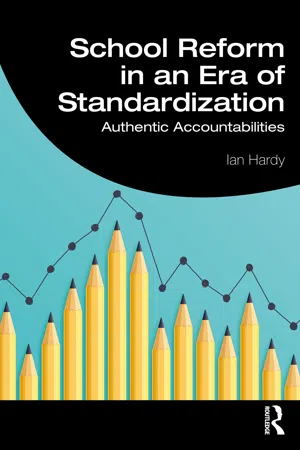
- 218 pages
- English
- ePUB (mobile friendly)
- Available on iOS & Android
About this book
School Reform in an Era of Standardization explores how teachers and school-based administrators navigate the processes of accountability and standardization in schooling systems and settings. It provides clear insights into how the work and learning of teachers and students in schools have been dramatically reconstituted by increased pressures of external, political scrutiny and accountability. The book reveals in detail the nature and effects of standardization processes upon schools and schooling systems. Specifically, it shows how curriculum development, teaching and assessment practices have all been recalibrated under conditions of increased external scrutiny of teacher and student work and learning, and how such processes are manifest in curriculum dominated by attention to literacy and numeracy, more 'scripted' pedagogies and standardized testing.
However, the research not only elaborates the detrimental effects of such processes, but also how those responsible for educating in schools – teachers, heads of curriculum, deputy-principals and principals – have responded proactively by interpreting, interrogating and challenging these conditions. In this way, it provides resources for hope – evidence of what are described as more 'authentic accountabilities' – and at the same time it provides a clear portrait of the difficulty of fostering substantive curriculum, teaching and assessment reform during an era of increasingly reductive accountability processes. It will be an invaluable resource for understanding and enhancing practices in schools and school systems in the decades to come, and for giving hope to educators in the ongoing work of rebuilding trust in public education.
Frequently asked questions
- Essential is ideal for learners and professionals who enjoy exploring a wide range of subjects. Access the Essential Library with 800,000+ trusted titles and best-sellers across business, personal growth, and the humanities. Includes unlimited reading time and Standard Read Aloud voice.
- Complete: Perfect for advanced learners and researchers needing full, unrestricted access. Unlock 1.4M+ books across hundreds of subjects, including academic and specialized titles. The Complete Plan also includes advanced features like Premium Read Aloud and Research Assistant.
Please note we cannot support devices running on iOS 13 and Android 7 or earlier. Learn more about using the app.
Information
1
INTRODUCTION
Introduction
Accountability and audit technologies
Accountability and audit in school education
Policy processes: Policy development and enactment
Global education policy-borrowing as a vehicle for audit and accountability
Table of contents
- Cover
- Half Title
- Title
- Copyright
- Dedication
- Contents
- Acknowledgements
- 1 Introduction: The rise of accountability and audit in schools
- PART I Philosophy, policy and politics
- PART II The politics of practice
- Index